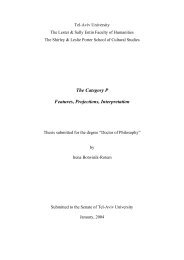You also want an ePaper? Increase the reach of your titles
YUMPU automatically turns print PDFs into web optimized ePapers that Google loves.
TEL AVIV UNIVERSITY REVIEW<br />
Summer 2010<br />
Cancer, emotions, schizophrenia <strong>and</strong><br />
the human soul may seem unrelated<br />
to one another as fields of study, but<br />
they all have one thing in common: The<br />
human mind. By integrating psychology<br />
into brain studies <strong>and</strong> other disciplines,<br />
TAU researchers are revealing<br />
the innermost workings of the mind<br />
<strong>and</strong> redefining the field for future<br />
generations of scientists.<br />
Only one thing about the human<br />
soul is certain: No one has found<br />
it with a microscope. But with the use<br />
of advanced tools, scientific research<br />
is increasingly being employed to<br />
discover what was once considered<br />
unknowable. By analyzing brain activity<br />
through an MRI scan, scientists<br />
are pursuing age-old questions about<br />
consciousness – how it can be defined<br />
in biological terms, <strong>and</strong> how our emotions<br />
manifest in the brain.<br />
Then philosophers step in, <strong>and</strong> ask:<br />
Can we truly define consciousness<br />
from a scientific perspective?<br />
TAU is advancing this debate<br />
with an interdisciplinary BA study<br />
track in consciousness research, a<br />
collaboration of the Lester <strong>and</strong> Sally<br />
Entin Faculty of Humanities with<br />
the George S. Wise Faculty of Life<br />
Sciences. This advanced track designated<br />
for particularly talented students<br />
consists of a double major in<br />
biology <strong>and</strong> philosophy, with a concentration<br />
on the theme of consciousness.<br />
This is just one of several new interdisciplinary<br />
frameworks at TAU that<br />
exp<strong>and</strong> the limits of the traditional<br />
social science field of psychology to<br />
incorporate ideas <strong>and</strong> technologies<br />
from six other faculties – humanities,<br />
arts, life sciences, medicine, exact sciences<br />
<strong>and</strong> engineering.<br />
“Mind <strong>and</strong> brain are not the same<br />
thing,” stresses Prof. Ehud Gazit,<br />
Vice President for Research <strong>and</strong><br />
Development at TAU. “They are<br />
entirely different conceptual frameworks.<br />
That is what is so special<br />
about our approach at TAU. We are<br />
searching for the deepest connections<br />
between the two – on the philosophical,<br />
biological, molecular <strong>and</strong> atomic<br />
levels.”<br />
Psychobiology: Key to<br />
unlocking disease<br />
Emerging as a cutting-edge interdisciplinary<br />
field, psychobiology is<br />
instrumental in the development of<br />
revolutionary treatments for mental<br />
illness <strong>and</strong> cancer, as well as new<br />
ways of analyzing mechanisms in<br />
the brain. Prof. Daphna Joel, head of<br />
TAU’s Psychobiology Program <strong>and</strong> a<br />
former head of the PhD Program in<br />
Neuroscience, says, “Through our research,<br />
we try to strip down the connection<br />
between behavior <strong>and</strong> the<br />
brain to its biological nuts <strong>and</strong> bolts.”<br />
In the area of schizophrenia, for<br />
example, the first behavioral signs of<br />
the disorder are being investigated at<br />
TAU using magnetic resonance im-<br />
By Ilana Teitelbaum<br />
3

















